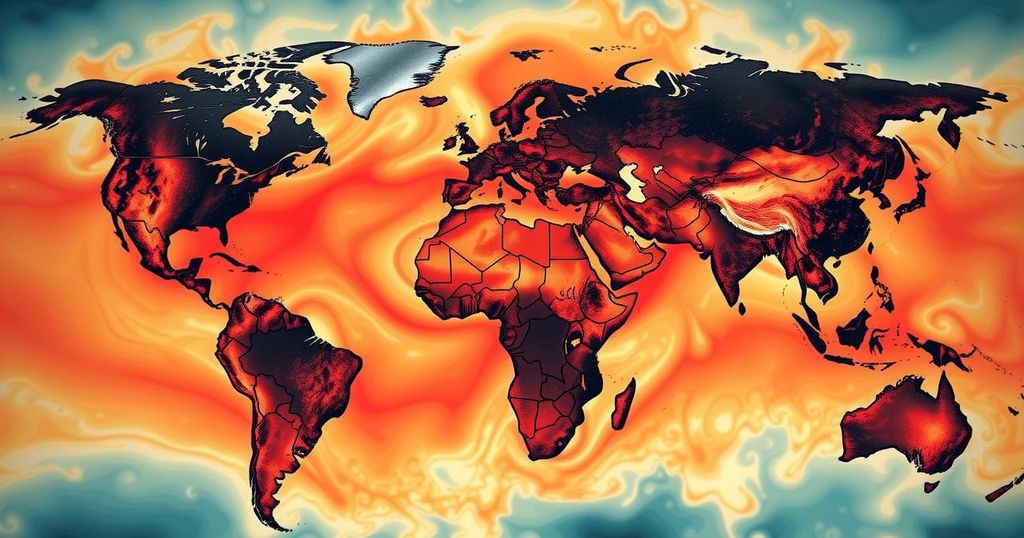2024 Marks Critical Milestone in Global Warming as Temperatures Exceed 1.5°C

In 2024, the global average temperature surpassed 1.5 degrees Celsius above pre-industrial levels for the first time. This milestone was confirmed by the Copernicus Climate Change Service, indicating a worsening climate crisis. The year was marked by unprecedented weather events and record temperatures, highlighting the urgent need for political commitment to reduce greenhouse gas emissions. Experts stress that the situation demands immediate action to mitigate further risks and adhere to the goals of the Paris Agreement.
In 2024, the world experienced its first full year in which global temperatures exceeded 1.5 degrees Celsius above pre-industrial levels, as confirmed by scientists from the European Union’s Copernicus Climate Change Service (C3S). Carlo Buontempo, the C3S director, remarked on the unprecedented temperature increases, noting that each month of the year ranked among the warmest on record. The average temperature for 2024 was recorded at 1.6 degrees Celsius above the 1850-1900 baseline, highlighting a concerning trend in global warming as each of the past ten years has set records for heat.
Despite the alarming increase, the breach of the 1.5 degree threshold does not violate the Paris Agreement’s long-term target, which focuses on average temperatures over a more extended period. Buontempo emphasized the urgency for nations to cut greenhouse gas emissions to alter this dangerous trajectory, stating, “It’s not a done deal. We have the power to change the trajectory from now on.” The effects of climate change have been visibly catastrophic, with wildfires, floods, and heatwaves reported worldwide, exposing the vulnerability of various nations regardless of economic status.
The year 2024 saw significant climate-related disasters in the United States, where 24 events caused damages exceeding $1 billion, underscoring the pressing need for political commitment to climate action. While some leaders, such as US President-elect Donald Trump, deny the realities of climate change, experts warn that the situation is dire. Professor Chukwumerije Okereke from the University of Bristol highlighted the 1.5 degree milestone as a crucial signal for political accountability, urging immediate action toward emission reductions to mitigate future risks. As noted by Zeke Hausfather of Berkeley Earth, the climatic changes are exacerbated by human activities, with projections indicating that 2025 will also rank among the hottest years recorded.
In addition to heightened temperatures, carbon dioxide concentrations reached an all-time high of 422 parts per million in 2024, indicating an urgent need for global leaders to address carbon emissions. Given the mounting evidence and the growing frequency of climate disasters, it is essential to mobilize political will and public awareness to combat climate change effectively.
The article analyzes the stark reality of global climate change, specifically addressing the alarming milestone reached in 2024 when average global temperatures surpassed the critical threshold of 1.5 degrees Celsius above pre-industrial levels. This shift reflects the cumulative impact of human activity on the planet’s climate, emphasizing the need for urgent interventions from governments worldwide. The discussion centers on recent weather events, scientific data regarding temperature increases, and the implications of failing to meet the targets set forth in the Paris Agreement. Understanding these elements is crucial to grasping the article’s essential theme regarding the intersection of politics, climate science, and environmental stewardship.
In summary, the year 2024 marked a significant inflection point in global climate change, witnessing the first complete year with temperatures exceeding the critical 1.5 degrees Celsius threshold. The data highlights not just a concerning trend in climate events, but also the urgent need for political action and commitment to emission reductions worldwide. High levels of carbon dioxide and the frequency of severe weather underscores the pressing reality of climate impacts, reinforcing the message that immediate global cooperation and accountability are essential to addressing these existential threats.
Original Source: sightmagazine.com.au






